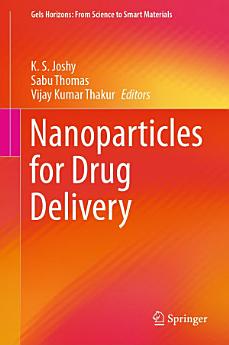Nanoparticles for Drug Delivery
Acerca de este libro electrónico
Acerca del autor
K. S. Joshy is a post-doctoral researcher at the International and Inter University Center for Nanoscience and Nanotechnology, Mahatma Gandhi University, Kerala, India. His research interests include synthesis and charecterization of nanoparticles with application for drug delivery. He has authored 10 research articles in high-impact journals, 1 book chapter and has been a co-editor on 1 book.
Sabu Thomas is currently Professor and Pro-Vice Chancellor in Mahatma Gandhi University, Kerala, India, in addition to being the founder director of the International and Inter University Centre for Nanoscience and Nanotechnology. After his B.Tech in polymer science and rubber technology from University of Cochin, he went on to do his PhD from Indian Institute of Technology, Kharagpur. Prof Thomas is the Chief Editor of Nano-Structures & Nano-Objects and has received many national and international awards, including Fellowship ofthe Royal Society of Chemistry, MRSI award, SESR award, the Dr APJ Abdul Kalam Award for Scientific Excellence, an honorary degree by Université de Lorraine, and multiple fellowships by prestigious societies and universities. Prof Thomas' research has spanned many areas of nanocomposite and polymer science and engineering, and he has edited more than 70 books, holds 5 patents and has authored over 750 research publications.
Dr Vijay Kumar Thakur is currently a faculty member in the School of Aerospace, Transport and Manufacturing at Cranfield University. Prior to this, Dr. Thakur worked as a Staff Scientist in the School of Mechanical and Materials Engineering at Washington State University, U.S.. Some of his other prior significant appointments include being a Research Scientist in Temasek Laboratories at Nanyang Technological University, Singapore and a Visiting Research Fellow in the Department of Chemical and Materials Engineering at LHU–Taiwan. Hedid his post-doctoral study in Materials Science & Engineering at Iowa State University and received Ph.D. in Polymer Chemistry (2009). He received his B.Sc. (Chemistry, Physics & Mathematics), B.Ed. and M.Sc. degree in Organic Chemistry from Himachal Pradesh University, Shimla, India. Dr. Thakur is an editorial board member of several SCI peer reviewed international journals as well as member of scientific bodies around the globe.




